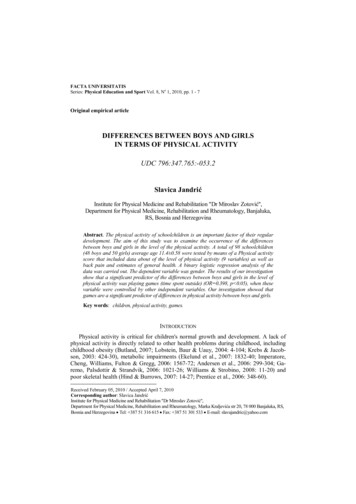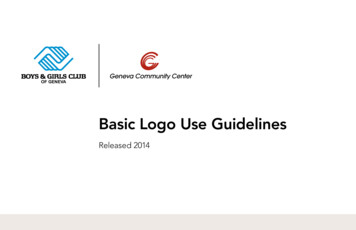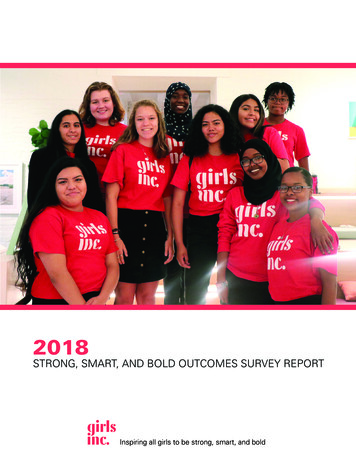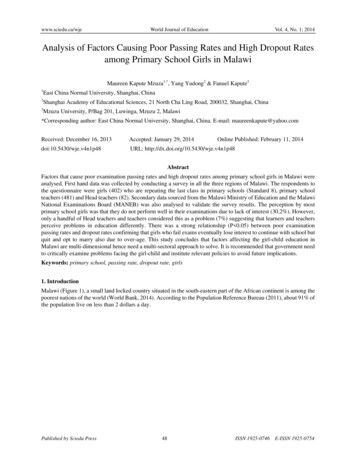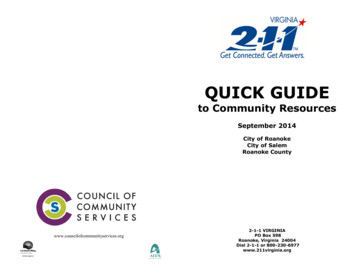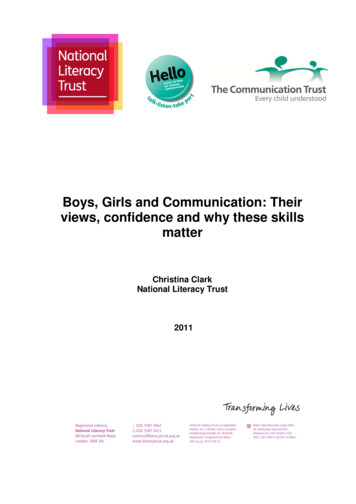
Transcription
Boys, Girls and Communication: Theirviews, confidence and why these skillsmatterChristina ClarkNational Literacy Trust2011
This report is the property of the National Literacy Trust and is protected by copyright law.The National Literacy Trust will consider requests to use extracts or data from this publicationprovided that you: acknowledge that the content is the work of the National Literacy Trust and provideappropriate references in any publications or accompanying publicity. anonymise all data to protect the identity of any individual or organisation. state that any views expressed are yours and not necessarily those of National LiteracyTrust.Suggested reference for this report is: Clark, C. (2011). Boys, girls and communication: Theirviews, confidence and why these skills matter. London: National Literacy Trust. National Literacy TrustGender and communicationApril 20112
AcknowledgementsWe would like to thank the pupils and staff at the following schools without whom this studywould not have been possible (in alphabetical order):Astor College for the Arts; Barham Primary School; Beckers Green Primary School; BeeslackCommunity High School; Benton Park High School; Blenheim Primary School and Children'sCentre; Boston Spa School; Brigidine School; Cathays High School Cardiff; Chichester HighSchool for Girls; Copleston High School; Corby Business Academy; Crumpsall Lane Primary;De Lisle Catholic Science College; Education Village; Excelsior Academy; Heritage ParkCommunity School (BESD); Hesleden Primary School; Holmbush Primary School; Isle ofSheppey Academy; King Edward Primary; Lambourn; Maidenhill School; Manor High School;Mayhill Junior School; Nicholas Breakspear Catholic School; Northgate Primary School;Oaklands Secondary School; Oulton Primary School; Park Junior School; Paston RidingsPrimary School; Samuel Ward Arts & Technology College; Scotch Orchard Primary School;Simon de Senlis Primary School; South Camden Community School; Southwater Junior School;St Lukes Islington; St Mary Redcliffe & Temple; St Mary’s CE Primary School; St Peter's RCHigh School; Startforth Morritt Memorial Primary School; Thomas Alleyne's High School; WestChiltington Community School; White Woman Lane Junior School; Whitefield School; WilliamParker Sports College.Thanks also go to Wendy Lee, Professional Director, from The Communication Trust for herinvaluable advice about speaking and listening issues.We would also like to thank The Communication Trust for their financial contribution that madethis survey possible. It was commissioned as part of the Hello campaign; national year ofcommunication. National Literacy TrustGender and communicationApril 20113
Table of contentsAcknowledgements . 3Executive summary . 5Introduction to this survey. 7Methodology. 8Contextualising this report: What young people think good communication skills are by gender 8Views on communication skills by gender. 9More views on communication skills by gender . 10Views on how communication skills should be acquired by gender . 12Young people’s confidence using certain communication skills by gender . 12Young people’s confidence communicating with certain groups of people by gender . 14Young people’s perception of the power of their voice by gender . 15How important do young people think communication skills are to their future life by gender . 16Which communication skills are the most important to succeed in life, at school, at universityand in the workplace by gender. 18Gender differences and communication – summing up . 20References. 21Tables and figuresTable 1: Views on communication by gender . 10Table 2: More views on communication by gender . 11Table 3: Confidence using communication skills by gender. 13Table 4: Confidence communicating with groups of people either face-to-face or online bygender. 14Table 5. Importance of certain factors when communicating with others by gender. 15Table 6: Percentage agreement or disagreement with attitudinal items assessing how importantthey think their views are by gender . 16Table 7: Most important skill to succeed in life, at school, at university and in the workplace bygender. 19Figure 1: Young people’s understanding of good communication skills by gender. 9Figure 2: How communication skills should be learned. 12Figure 3: Which communication skills would you like to be better at by gender . 14Figure 4: One needs good communication skills in order to by gender . 17Figure 5: One needs good communication skills in order to Part 2 by gender . 17Figure 6: The most important thing in the future is by gender. 18 National Literacy TrustGender and communicationApril 20114
Executive summaryThis is the first large-scale survey of young people’s views on communication skills in the UK.The purpose of this survey was three-fold. Since a search of the published literature hadhighlighted real gaps in knowledge, we wanted answers to the following questions: What doyoung people think about communication skills? Are they confident in their skills and howimportant do they think these skills are at school, in the workplace or in wider society? Thisreport explores these issues by gender.An online survey was conducted in June/July 2010. Overall, 6,865 young people aged 8 to 16from 47 schools participated in our online survey. 46 were schools from England, one was fromWales. There was an almost equal gender split in the sample, with 51.5% of boys (N 3,511)and 48.5% of girls (N 3,309) participating in this survey.Young people and communication skills: Gender differences More girls than boys believed that having good communication skills means being goodat talking and being good at listening. By contrast, significantly more boys than girlsbelieved that it means being good at ICT (Information Communication Technology). 5 in 10 boys compared with 4 in 10 girls strongly agreed that good communication skillsboost their confidence in social situations. 3 in 10 boys compared with 2 in 10 girls alsostrongly agreed that good communication skills are often taken for granted and thatthere is the danger that they are not taken seriously if they do not express their viewsclearly. More boys than girls were also concerned that they would be seen as not very intelligentif they cannot communicate well and that people judge them by the words they use. While nearly as many boys as girls agreed that they had been told off for the way theyspeak, 3 in 10 boys compared with 2 in 10 girls strongly agreed that they have been toldoff for not listening. Slightly more boys than girls (2 in 10 vs. 1 in 10) also strongly agreed that they spendmore time online or in front of the telly than talking with their family. While roughly the same small proportion of boys and girls agreed that a posh accentmakes one a better speaker, significantly more boys (4 in 10) than girls (3 in 10) agreedoverall that celebrities who speak well are more intelligent. Boys were more likely to take an auto-didactic approach to learning communicationskills, with more boys than girls believing that children should just pick communicationskills up. By contrast, more girls than boys believed that the family should help childrento learn these skills. There were some differences between boys and girls in their confidence to use certaincommunication skills, with boys tending to feel more confident overall than girls. Boyswere more likely than girls to say that they feel confident speaking in front of classmates,saying no to friends, talking to new people, explaining their points of view and asking National Literacy TrustGender and communicationApril 20115
when they do not understand anything. While boys are more confident than girls in theseareas, girls would like to be more confident using these skills. Boys were more likely than girls to say that they are confident talking with teachers andother adults. There were no significant gender differences in young people’s confidencein talking with friends and family. Boys were more likely than girls to agree overall that it is important that they can hearthe other person’s voice when they are communicating with others. Boys were also morelikely than girls to overall agree that it is important that they use the right words whencommunicating with others. By contrast, girls appear to rely more on visual cues whencommunicating with others, with 7 in 10 girls compared with 6 in 10 boys agreeingoverall that it is important that they can see what the other person’s face is doing. Exploring their self-esteem, boys and girls agreed on how important their opinions are toothers. A similar proportion of boys and girls agreed overall that their classmates listento what they have to say, that their point of view is important, that one should say whatone thinks no matter what the situation and that one will be left out if one does not speakup. An equal proportion of girls and boys also agreed overall that adults should listenmore to young people. An equal proportion of boys and girls said that one needs good communication skills todo well at school and at university/college. While slightly more boys than girls believedthat one needs good communication skills to do well at work and to do well in general,these differences were not statistically significant. Boys and girls did not differ in how important they thought good communication skills areto get good qualifications, to get on with family and friends, and to have a fulfilling life,but girls (8 in 10) were more likely than boys (7 in 10) to say that one needs goodcommunication skills to get a good job. When asked to select from a list the most important goal in life, girls (3 in 10) were morelikely than boys (2 in 10) to say that it would be to be happy. By contrast, more boys thangirls rated being successful in their job as the most important goal they would like toobtain. However, there was no difference between boys and girls in how important they thoughtgood communication skills are in order to obtain this goal, with 9 in 10 boys and girlssaying that good communication skills are either very important or important to reach thevalue that they rated as most important. Both boys and girls believed that speaking skills are the most important skill to have tosucceed in life, though more girls (4 in 10) than boys (3 in 10) believed that. Boys weremore likely than girls to believe that maths and ICT are the most important skills tosucceed in life. Both boys and girls believed that listening skills are the most important skill to succeedat school and at university/college but again more girls than boys believed this. Again,boys were more likely than girls to say that maths and ICT are the most important skillsto succeed at school and at university/college. The majority of girls (3 in 10) believed that the most important skill to succeed in theworkplace is speaking, while the majority of boys (3 in 10) believed that listening is themost important skill to succeed at work. National Literacy TrustGender and communicationApril 20116
Introduction to this surveyConsidering recent media stories and comments, you would be forgiven for believing that youngpeople nowadays communicate in grunts and other mono-syllabic utterances, and expressthemselves like TV characters Vicky Pollard or Harry Enfield’s Kevin the teenager.Employers also bemoan the lack of young people’s communication skills, with many believingthat it impacts on their chances of making it through an interview and their future employability.But concerns about communication skills start even in the primary years, with many schoolheads observing that children now start primary school without the necessary skills.However, what is largely lacking from the debate are the views of young people. What do youngpeople think about their communication skills? Are they confident in their skills and howimportant do they think these skills are at school, in the workplace or in wider society?Since very little is known about young people’s attitudes towards speaking and listening as wellas wider communication skills, the purpose of this survey will be three-pronged to explore whatyoung people think about communication skills, how confident they are in their skills and howimportant they think these skills are at school, in the workplace or in wider society. Some ofthese topics have been covered in previous small-scale qualitative studies (such as the study byThe Communication Trust in 2009), but this will be the first time that the views of a large numberof young people will be collected on these issues.Answers to the above question will also form part of the evidence base to support Hello, whichis the national year of communication, a campaign to increase understanding of how important itis for children and young people to develop good communication skills.The campaign is run by The Communication Trust, a coalition of 40 leading voluntary sectororganisations in partnership with Jean Gross, the Government’s Communication Champion.Together, the aim is to make 2011 the year when children’s communication skills become apriority in schools and homes across the country. The campaign is supported by BT andPearson Assessment and is backed by the Department for Education and Department forHealth.Please visit www.hello.org.uk for further information.Focus of the present reportThe present report focuses on the potential differences between boys and girls in terms of theirviews of communication skills, their confidence in using them and the importance they place onthem. More specifically, it explores: What boys and girls think good communication skills areWhat they think about communication skillsHow confident they are communicating with various people and using various skillsHow important they think good communication skills are to succeed in various aspectsof lifeWhat the most important skills are to succeed in life, at school, at university/college andin the workplace National Literacy TrustGender and communicationApril 20117
MethodologyAn invitation to participate in this online survey was sent out in National Literacy Trustnewsletters at the beginning of April.The online survey consisted of 35 questions, exploring young people’s background, preferredways of communication, confidence using various communication skills and the importance theyplace on communication skills to succeed in various aspects of life. Due to the complexity of thequestions and some concepts, the decision was made to restrict the age range of participatingpupils to upper KS2 (9 to 11 years) and older, though schools could survey pupils as young aseight at their discretion.68 schools expressed an interest to take part in the survey. A link to the online survey alongsideguidance notes for teachers was emailed to the schools at the beginning of June 2010. Thesurvey was online between 14 June and 2 July. It took an average of 20 minutes for youngpeople to complete the survey. Schools were offered a school-specific summary report as anincentive to take part.Overall, 6,865 pupils from 47 schools participated in our online survey. 46 were schools fromEngland, one was from Wales. There was an almost equal gender split in the sample, with51.5% of boys (N 3,511) and 48.5% of girls (N 3,309) participating in this survey. Therewere no significant differences between boys and girls in terms of age, ethnic background andwhether they receive free school meals or not.Contextualising this report: What young people think goodcommunication skills are by genderThe purpose of this survey was three-fold. Since a search of the published literature hadhighlighted real gaps in knowledge, we wanted answers to the following questions: What doyoung people think about communication skills? Are they confident in their skills and howimportant do they think these skills are at school, in the workplace or in wider society?In order to anchor responses to this survey and to get an understanding of what boys and girlsthink of when they hear the phrase “communication skills”, they were asked to indicate whatthey think having good communication skills means.Figure 1 shows that significantly more girls than boys believed that having good communicationskills means being good at talking and being good at listening. By contrast, significantly moreboys than girls believed that it means being good at ICT. There were no differences betweenboys and girls in the degree to which they believed that having good communication skillsmeans being good at reading and writing. National Literacy TrustGender and communicationApril 20118
Figure 1: Young people’s understanding of good communication skills by gender76.0%Good at talking80.2%74.8%Good at listening81.7%48.4%Good at reading45.1%45.6%Good at writing45.2%42.8%Good at ICT34.8%BoysGirlsViews on communication skills by genderNow knowing that both boys and girls associate good communication skills with speaking andlistening, we wanted to know a little more about young people’s views on communication skills,and how these views may differ depending on gender.This section outlines boys’ and girls’ views about communication skills as a confidence aid insocial situations, the degree to which those skills are taken for granted and the perceivedrelationship between good communication skills and intelligence. Views in relation to theworkplace are outlined towards the end of this chapter.Interestingly, proportionately more boys than girls agreed with the statements that assessedwhat they think about communication skills in terms of the confidence it affords them, whetherthey feel that they are taken for granted and whether there is a link with intelligence (see Table1).For example, 5 in 10 boys compared with 4 in 10 girls strongly agreed that good communicationskills boost their confidence in social situations. 3 in 10 boys compared with 2 in 10 girls alsostrongly agreed that good communication skills are often taken for granted and that there is thedanger that they are not taken seriously if they do not express their views clearly.More boys than girls were also concerned that they would be seen as not very intelligent if theycannot communicate well and that people judge them by the words they use. National Literacy TrustGender and communicationApril 20119
Table 1: Views on communication by genderGoodcommunicationskills are some ofthe most importantskills to haveGoodcommunicationskills give me moreconfidence in socialsituationsPeople often takengoodcommunicationskills for grantedIf I don’t express myviews clearly then Idon’t get listened toIf I have difficultycommunicating,then people mightthink that I am notvery intelligentPeople judge you bythe language (wordsand phrases) %%Stronglydisagree%Do ls24.642.366.918.24.810.0(Note: figures in bold indicate significant differences between boys and girls)More views on communication skills by genderWhereas the previous section has explored girls’ and boys’ views about good communicationskills and how they are linked to social situations and even intelligence, this section explores inmore detail how they feel about speaking and listening. For example, it investigates, amongother things, whether it is easier to express oneself if one speaks face-to-face, whether having aposh accent makes one a better speaker and whether celebrities who speak well are seen asmore intelligent.Table 2 shows that a similar proportion of boys and girls agreed that it is easier to get a pointacross when talking face-to-face and that they are more confident to say things online or by textthan they are to say certain things face-to-face.While nearly as many boys as girls agreed that they had been told off for the way they speak, 3in 10 boys compared with 2 in 10 girls strongly agreed that they have been told off for notlistening.Slightly more boys than girls (2 in 10 vs. 1 in 10) also strongly agreed that they spend more timeonline or in front of the television than they spend talking with their family. National Literacy TrustGender and communicationApril 201110
While roughly the same small proportion of boys and girls agreed that a posh accent makes onea better speaker, significantly more boys (4 in 10) than girls (3 in 10) agreed overall thatcelebrities who speak well are more intelligent.Table 2: More views on communication by gender%Stronglydisagree%Do 79.1Being confidentmakes you a 889.15.21.14.6Having a poshaccent makes you abetter 6.326.48.0I think celebritieswho speak well aremore 931.341.512.314.9It is easier to getyour point acrosswhen you speakface-to-faceCommunicatingonline or by textgives me theconfidence to saythings I wouldn’tsay face-to-faceI have been told offfor the way I speakI have been told offfor not listeningI communicate withmy friends more bywriting than bytalkingI spend more timeonline and watchingTV than I spendspeaking to nt%Boys49.236.9Girls47.2Boys(Note: figures in bold indicate significant differences between boys and girls) National Literacy TrustGender and communicationApril 201111
Views on how communication skills should be acquired bygenderDo boys and girls differ in their views on how communication skills should be learned? Figure 2shows that boys are more likely to take an auto-didactic approach to learning communicationskills, with more boys than girls believing that kids should just pick communication skills up. Bycontrast, more girls than boys believed that the family should help kids learn these skills.Figure 2: How communication skills should be learned52.4%Parents should helpthem55.6%28.4%Teachers should helpthem29.3%19.2%Should just pick it up15.0%BoysGirlsYoung people’s confidence using certain communicationskills by genderThis section explores whether there are any differences between boys and girls in howconfident they are in using a variety of communication skills.Table 3 shows that there are some differences between boys and girls in their confidence touse certain communication skills, with boys tending to feel more confident overall than girls.Boys are more likely than girls to say that they feel confident speaking in front of classmates,saying no to friends, talking to new people, explaining their points of view and asking when theydon’t understand anything. While boys are more confident than girls in these areas, Figure 3(p.14) shows that girls would like to be more confident using these skills.By contrast, more girls than boys say that they feel confident talking online and listening to otherpeople’s opinions and Figure 3 shows that boys would like to gain confidence in these areas. National Literacy TrustGender and communicationApril 201112
Table 3: Confidence using communication skills by genderVeryconfidentConfidentOverallconfidenceNot veryconfidentNot at allconfidentDo 52.93.8Girls24.044.568.525.23.92.4Talking in a groupSpeaking in front ofclassmatesSaying no to friendsTalking to newpeopleTalking to peopleonlineTalking in a differentway to differentpeopleExplaining yourpoint of viewListening to otherpeople’s opinionsAsking when youdon’t understandsomething(Note: figures in bold indicate significant differences between boys and girls) National Literacy TrustGender and communicationApril 201113
Figure 3: Which communication skills would you like to be better at by gender42.0%47.2%Talking to new people39.6%Speaking in front of classmates49.6%35.4%40.8%Asking when you don’t understand something30.5%36.1%Saying no to friends30.0%31.9%Explaining your point of view28.7%27.1%Talking in a group25.7%20.2%Listening to other people’s opinionsTalking in a different way to different people23.4%20.3%Talking to people online22.7%17.3%BoysGirlsYoung people’s confidence communicating with certaingroups of people by genderIn addition to learning about how confident young people are in using different skills, we alsowanted to know more about their level of confidence in communication with certain groups ofpeople. Table 4 shows that boys were more likely than girls to say that they are confidenttalking with teachers and other adults. There were no significant gender differences in youngpeople’s confidence in talking with friends and family.Table 4: Confidence communicating with groups of people either face-to-face or onlineby t veryconfidentNot at allconfident%Do .51.50.40.5Talking with friendsTalking with family National Literacy TrustGender and communicationApril 201114
Veryconfident%Confident%Overallconfidence%Not veryconfidentNot at allconfident%Do notknow%%Talking withteachersTalking with 5.466.425.24.63.8(Note: figures in bold indicate significant differences between boys and girls)Importance of certain factors when communicating withothers by genderBoys were more likely than girls to agree overall that it is important that they can hear the otherperson’s voice when they are communicating with others (see Table 5). Boys were also morelikely than girls to overall agree that it is important that they use the right words whencommunicating with others. By contrast, girls appear to rely more on visual cues whencommunicating with others, with 7 in 10 girls compared with 6 in 10 boys agreeing overall that itis important that they can see what the other person’s face is doing.Table 5. Importance of certain factors when communicating with others by genderYou see what theirface is %Stronglydisagree%Do 6.067.020.44.38.2You hear their voiceYou use the rightwordsYoung people’s perception of the power of their voice bygenderExploring their self-esteem, boys and girls agreed on how important their opinions are to others(see Table 6). A similar proportion of boys and girls agreed overall that their classmates listen towhat they have to say, that their point of view is important, that one should say what one thinks National Literacy TrustGender and communicationApril 201115
no matter what the situation and that one will be left out if one does not speak up. An equalproportion of girls and boys also agreed overall that adults should listen more to young people.Table 6: Percentage agreement or disagreement with attitudinal items assessing howimportant they think their views are by genderMy classmates listento what I have to sayMy point of view ement%%Stronglydisagree%Do 0
likely than girls to overall agree that it is important that they use the right words when communicating with others. By contrast, girls appear to rely more on visual cues when communicating with others, with 7 in 10 girls compared with 6 in 10 boys agreeing overall that it is important that they can see what the other person's face is doing.



